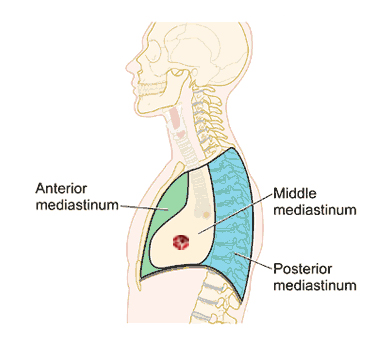
What is Mediastinal Tumor?
Tumors are masses of cells. They can be benign or malignant. Mediastinal tumors are growths that form in the area of the chest that separates the lungs. This area, called the mediastinum, is surrounded by the breastbone in front, the spine in back, and the lungs on each side. In general, mediastinal tumors are rare. Mediastinal tumors are usually diagnosed in older age people, but they can develop at any age.
Tumors of mediastinal origin include tumors from the thymus, nerves, lymphatic tissue such as lymph nodes, connective tissue or germ cells.
We provide mediastinal tumor treatment in Bangalore.
Here, you will find information about signs and symptoms, causes and risk factors, types, diagnosis, staging and prevention about mediastinal tumor.
Some people who have mediastinal tumors experience no symptoms. The tumors go undiagnosed until the need for a chest X-ray. Symptoms often result from the pressure put by the tumors onto the surrounding structures, such as the spinal cord, heart or the pericardium, and may include:
Cough with or without blood
Shortness of breath and hoarseness
Chest pain (somewhat rare)
Flushing
Fever
Chills
Night sweats
Unexplained weight loss and anaemia
Lymphadenopathy (swollen or tender lymph nodes)
Wheezing and/or stridor (high-pitched and noisy breathing, which could mean a blockage)
Eye issues (drooping eyelid, small pupil) on one side of the face
Certain risk factors associated with mediastinal tumors are:
Age
Gender
Immune deficiency
Gene mutations and infection
Thymoma, or tumors of the thymus
Lupus
CAN-C: Well-known for providing most innovative treatments for mediastinal tumor in Bangalore.
Types of mediastinal tumors are as follows:
Anterior mediastinal masses
Middle mediastinal masses
Posterior mediastinal masses
Thymoma: The most common anterior mass is a thymoma. There are different types of thymomas. The larger irregular masses, malignant thymic carcinomas are much more aggressive and have a much worse prognosis.
Lymphoma: It is a cancer that arises in cancer-fighting cells called lymphocytes. Lymphoma usually starts in lymph nodes, the spleen or the bone marrow. Infrequently, lymphoma starts in the anterior mediastinum. There are 2 categories of lymphoma:
a. Hodgkin's disease.
b. Non-Hodgkin's lymphoma.
Germ cell: A rare mediastinal mass is a germ cell tumor. They are very rare. They are usually benign (60% to 70%) and are found in both males and females.
Thyroid mass: Substernal goiter remains a significant consideration in the differential diagnosis of mediastinal masses, particularly those located in the anterior mediastinum. Substernal goiter is generally defined as a thyroid mass that has 50% or more of its volume located below the thoracic inlet.
Neurogenic tumor: The most common cause posterior mediastinal tumors arise from nerves. They are usually benign, especially in adults. They are usually on the side of the backbone. These are classified as nerve sheath neoplasms, ganglion cell neoplasms, and paraganglionic cell neoplasms.
Tracheal tumors: These can be benign or malignant.
Esophageal tumors: These can be benign or malignant.
CAN-C: Best cancer centre specially designed for mediastinal tumor treatment in Bangalore.
The tests most commonly used to diagnose and evaluate a mediastinal tumor include:
Chest x-ray
Computed tomography (CT) scan or a CT-guided biopsy of the chest
Magnetic resonance imaging (MRI) of the chest
Mediastinoscopy, a surgical procedure, with a biopsy of the tissue. A mediastinalscope is inserted into the mediastinum through a small incision in the chest. The scope has a camera on the end to give a clear view of the area. Tissue may be removed to perform a biopsy to test the cells for signs of cancer.
Blood tests.
Alpha feto protein (AFP), beta HCG, LDH
Tissue Biopsy
Anterior mediastinotomy (Chamberlain procedure): Incision is made in the chest to get a piece of tissue from the mass.
EBUS (EndoBronchial UltraSound): The tissue is obtained with a needle aspiration so only a small amount of tissue can be obtained.
We at CAN-C pride ourselves in being known for top centre for mediastinal tumor treatment in Bangalore.
Staging is a measurement of how far the tumor has spread. This is called staging. After all the tests have been completed and the results are known, it should be possible to tell what stage the tumor is.
Mediastinal tumor is staged using the TNM system:
T (tumor): This describes the size of the original tumor.
N (node): This indicates whether the tumor is present in the lymph nodes.
M (metastasis): This refers to whether tumor has spread to other parts of the body.
Treatment chances can be improved by finding the tumor early.
"CAN-C: Best centre for offering a full range of mediastinal tumor treatment in Bangalore."
Make An Appointment Today
How Mediastinal Tumor is treated?
Mediastinal tumors may be treated with surgery, chemotherapy and radiation or a combination of these options. The treatment will depend on the type of tumor, location and the overall health of the patient.
Thymic cancers are treated with surgery. For neurogenic tumors of the posterior mediastinum, surgery is the main treatment.
Surgery may be followed by radiation therapy or chemotherapy, depending on the stage of the tumor and the success of the surgery.
Germ cell tumors are usually treated with chemotherapy. For lymphomas, chemotherapy is the treatment of choice, and is possibly followed by radiation.
CAN-C: Highly recognized for offering personalized treatment options for mediastinal tumors in Bangalore.
Our Doctors
Dr. Dinesh M G
Specialty: Surgical Oncologist & Laparoscopic Oncosurgeon
Dr. Dinesh M G, is an efficient surgeon specialized in oncology committed to the care and improvement of quality of life of cancer patients. His exceptional surgical skills, teamwork and knowledge are laudable. He is skilled in performing various minimal access oncologic surgeries and has mastered complex open surgeries in the field of oncology.
Completing MBBS from KIMS, Bangalore followed by MS - General Surgery from JJM Medical College, Davangere and M. Ch - Surgical Oncology from Kidwai Memorial Institute of Oncology, he has a Fellowship in Minimal Access Oncology from Basavatarakam Indo American Cancer Institute.

